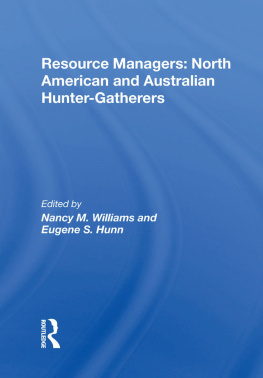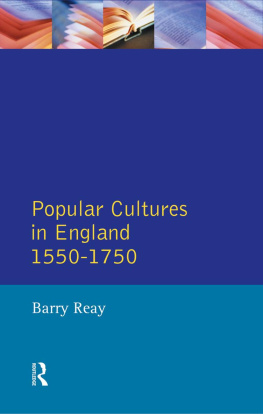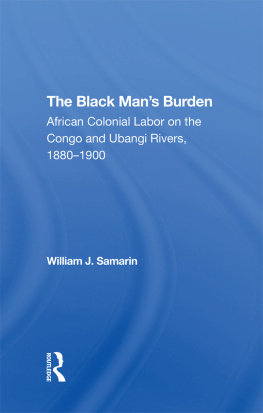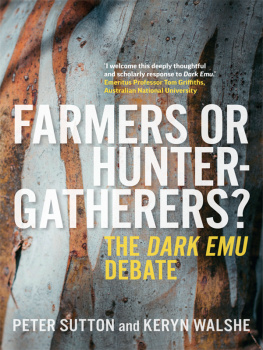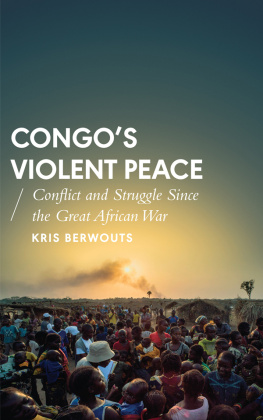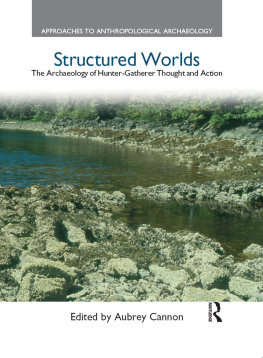Hunter-Gathers of the Congo Basin
Hunter-Gathers of the Congo Basin
Cultures, Histories, and Biology of African Pygmics
Barry S. Hewlett, editor
First published 2014 by Transaction Publishers
Published 2017 by Routledge
2 Park Square, Milton Park, Abingdon, Oxon OX14 4RN
711 Third Avenue, New York, NY 10017, USA
Routledge is an imprint of the Taylor & Francis Group, an informa business
Copyright 2014 Taylor & Francis.
All rights reserved. No part of this book may be reprinted or reproduced or utilised in any form or by any electronic, mechanical, or other means, now known or hereafter invented, including photocopying and recording, or in any information storage or retrieval system, without permission in writing from the publishers.
Notice:
Product or corporate names may be trademarks or registered trademarks, and are used only for identification and explanation without intent to infringe.
Library of Congress Catalog Number: 2013035960
Library of Congress Cataloging-in-Publication Data
Hunter-gatherers of the Congo Basin : cultures, histories and biology of African Pygmies / Barry S. Hewlett, editor.
pages cm
1. Pygmies--Congo River Watershed--History. 2. Pygmies--Congo River Watershed--Social life and customs. 3. Hunting and gathering societies--Congo River Watershed. 4. Ethnology--Congo River Watershed. 5. Human biology--Congo River Watershed. 6. Congo River Watershed--Ethnic relations. 7. Congo River Watershed--Social life and customs. I. Hewlett, Barry S., 1950- editor of compilation, author.
DT650.P94H66 2014
305.896067--dc23
2013035960
ISBN 13: 978-1-4128-5361-3 (pbk)
Contents
Luigi Luca Cavalli-Sforza
Barry S. Hewlett
Serge Bahuchet
Paul Verdu
Karen Lupo, Alfred Jean-Paul Ndanga, and Christopher Kiahtipes
Robert E. Mose
Alain Froment
Hiroaki Sato
Susanne Frniss
Jerome Lewis
Barry S. Hewlett
Stephanie Rupp
Kiyoshi Takeuchi
Mitsuo Ichikawa
The idea and inspiration for this book emerged at an International Congo Basin Hunter-Gatherer Conference held in Montpellier, France, in September 2010, co-organized by myself, Edmond Dounias, and Kiyoshi Takeuchi. I would like to sincerely thank my co-organizers for the immense amount of time and effort they devoted to making it a vibrant, stimulating, and fun conference. The chapters in the book are not papers from the conference. Leading authorities on topics or theories dealing with Congo Basin hunter-gatherers at the conference were instead asked to write summary overviews and critiques of their areas of specialization.
It was an enormous pleasure to work with all of the authors of the various chapters. The backgrounds, theories, and views of Congo Basin hunter- gatherers vary dramatically between authors, but all were very friendly, responsive, and open to comments and suggestions. It was an honor to work with such an outstanding and professional group of scholars.
The book would not have been possible without the editorial assistance of WSU graduate student Scott Calvert. He carefully read and edited chapters from authors with English as a second language and made insightful and useful comments all along the way. I want to thank Jennifer Nippins at Transaction for her patience in submitting the book and to Hannah Jones for all of her enthusiastic support in the production process.
Of course, none of this book would have been possible without the hospitality, graciousness, and tolerance of the forest peoples from the Congo Basin. They allowed researchers into their homes to conduct (often strange) research on a wide range of topics. We all want to gratefully acknowledge all of this assistance and hope that at least some of the research will be useful to them and to development agencies trying to assist them in the future.
Luigi Luca CavalliSforza
It was for me a tremendous pleasure to be asked to write the foreword to this book, Hunter-Gatherers of the Congo Basin, generated by my old friend and collaborator, Barry Hewlett. This book represents the work of many old friends of both of us, each of whom contributed research on aspects of different hunter-gatherers and is mostly based on direct field experience with the populations who are the subject of this book.
It may come as a surprise that in order to understand the origin of our species it is necessary to examine African populations, principally taking interest in the direct descendants of their most ancient ancestors. In fact, even if we cannot give precise dates of origin, it is clear that our species originated relatively recently from African ancestry and that a few direct descendants of these early ancestors are still living in basic subsistence-level conditions in the areas where their evolutionary process most likely started.
The changes underlying modern societies have taken place in relatively little time. The rapid development of new living conditions was made possible by the invention of food production, which took only a few thousand years to spread through the world, bringing about a fast and strong cultural and social evolution that caused a substantial modification of the environment in which we live.
My own research with African Pygmies and the travels to visit many other aboriginal peoples have convinced me that we can learn immensely from them, far beyond genetic knowledge. Their careful management of the environment, the deep acquaintance with plants and animals around them, their peaceful style of life, unhindered by statutory laws but based on mutual respect and recognition of equality, are in many ways their cultural legacy to us, the contemporary descendants of the farmer-breeders who replaced hunter-gatherers, built hierarchic societies, and remodeled the face of the planet.
These surviving, transformed groups of hunter-gatherers embody the wisdom of our own antiquity. The changes we have inflicted on our environment will force us to be more careful in avoiding further alterations of the ecosystem in order to continue to live reasonably well, and hopefully increasingly better, in the surroundings where we live at present. It is of course possible, or even likely, that in the course of time we will, or will have to, look for other planets where to expand.
Aka woman with spear, large knife, and baby. (Courtesy of B. Hewlett)
Aka men with hunting nets. (Courtesy of B. Hewlett)
The African Pygmies of the Congo Basin are the largest and most diverse group of active hunter-gatherers that remain in the world. At least fifteen different ethnolinguistic groups exist in the Congo Basin, with a total population of 250,000 to 350,000 individuals (see for names, locations, and populations of major ethnic groups). Because it has the largest group of hunter-gatherers in the world, research in this region can provide detailed and rich insights into the commonalities and diversity of a way of life that has characterized most of human history. Pygmies may be able to increase our understanding of the past, but they are modern humans facing the modern human problems of globalization and exploitation. This volume addresses regional and global hunter-gatherer research questions as well as the contemporary social issues confronting foragers in the Congo Basin.


